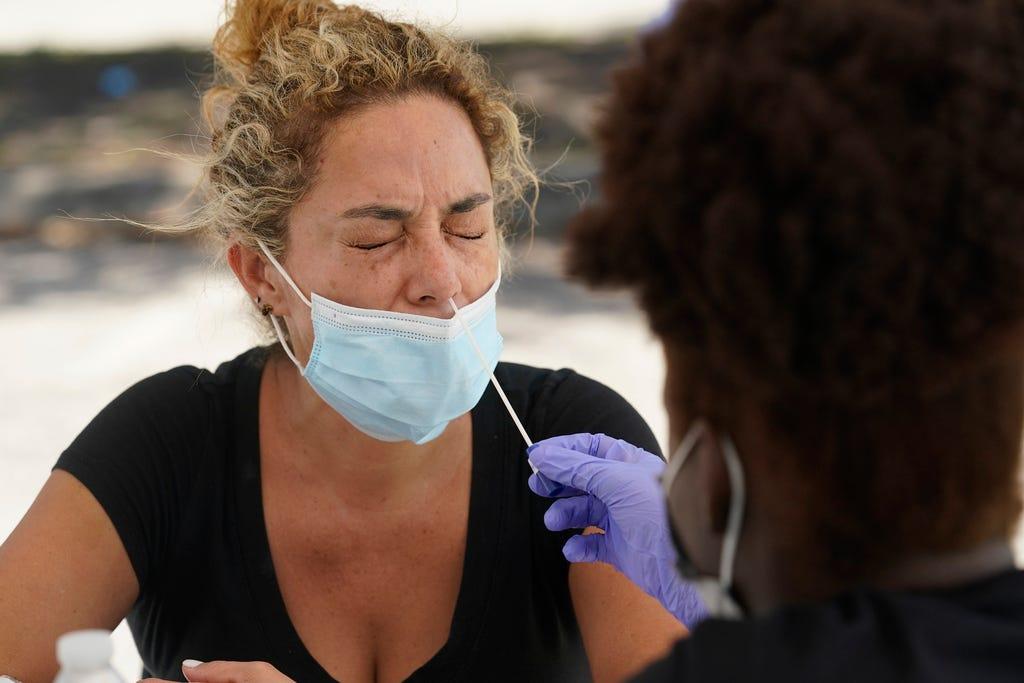[ad_1]
A Houston hospital has its first case of the lambda variant of the coronavirus, but public health experts say it remains too soon to tell whether the variant will rise to the same level of concern as the delta variant currently raging across unvaccinated communities in the U.S.
About 83% of COVID-19 cases in the U.S. are from the delta variant and the vast majority of hospitalizations are among unvaccinated people, according to the Centers for Disease Control and Prevention.
The lambda variant, on the other hand, has been identified in less than 700 cases in the U.S. However, the World Health Organization in June called lambda a “variant of interest,” meaning it has genetic changes that affect the virus’ characteristics and has caused significant community spread or clusters of COVID-19 in multiple countries.
Dr. S. Wesley Long, medical director of diagnostic biology at Houston Methodist, where the case was identified, said while lambda has some mutations that are similar to other variants that have raised concern, it does not appear to be nearly as transmissible as delta.
“I know there’s great interest in lambda, but I think people really need to be focused on delta,” Long said. “Most importantly, regardless of the variant, our best defense against all these variants is vaccination.
The fourth wave of COVID-19 cases is here: Will we escape the UK’s fate? It’s too soon to know.
What is the lambda variant and how is it different from the delta variant?
The lambda variant is a specific strain of COVID-19 with specific mutations. It’s one of a handful of variants identified by the WHO as variants of concern or interest. Many other variants have arisen since the outbreak was first detected in late 2019 in central China.
“The natural trajectory of viruses is that they have a tendency to have mutations, and whenever we have a significant mutation that changes the virus … we get a new variant,” said Dr. Abhijit Duggal, a staff ICU physician and director for critical care research for the medical ICU at the Cleveland Clinic.
Story continues
Some of the lambda mutations occur in its spike protein, which is the part of the virus that helps it penetrate cells in the human body and is also what the vaccines are targeting.
Do you need another shot?: Booster for COVID-19 is not recommended, yet. Here’s what to know.
Mutations occurring there and in other parts of lambda are similar to those in variants of concern, like alpha and gamma, Long said. But even gamma, which never took hold in the U.S. to the same level as alpha or delta, has more concerning mutations than lambda, Long said.
Duggal said there hasn’t been anything specific with the lambda variant to spark concern about it becoming the dominant variant in the U.S., but “watchful waiting and being cautious is going to be the most important thing at this point.”
Where was the lambda variant first identified?
The lambda variant was first identified in Peru in December 2020. Since April, more than 80% of sequenced cases in the country have been identified as the lambda variant.
As of June, the WHO said it had identified the lambda variant in 29 countries. Argentina and Chile have also seen rising lambda cases, the WHO said.
Tracking the outbreak: How COVID-19 is spreading across the U.S.
However, the variant hasn’t spread nearly to the same level on a global scale as the delta variant. Lambda may have become so widespread in parts of South America largely because of a “founder effect,” Long said, wherein a few cases of the variant first took hold in a densely populated and geographically restricted area and slowly became the primary driver for the spread locally over time.
Long compared lambda to the gamma variant, which first was detected in Brazil and spread in similar ways
Are COVID-19 vaccines effective against the lambda variant?
Studies have suggested the vaccines currently authorized for use in the U.S. are highly effective at preventing severe COVID-19 and death across multiple variants.
Duggal said while there is not reason to believe the vaccines will be ineffective against the lambda variant, more data is need to know exactly how effective it will be. The efficacy may lower some, but hospitalization may still be largely preventable in variant cases with vaccination, he said.
‘Nothing in this world is 100%’: Those fully vaccinated against COVID-19 can be infected, but serious illness is rare
However, a new study posted online Tuesday found the Johnson & Johnson vaccine was not as effective at preventing symptomatic disease when faced with the delta and lambda variants. The study was not yet peer reviewed or published in a journal, but it aligned with studies of the AstraZeneca vaccine that conclude one dose of the vaccine is 33% effective against symptomatic disease of the delta variant.
Vaccines made by Pfizer-BioNTech and Moderna have shown to keep similar levels of effectiveness against several of the variants of concern.
Getting vaccinated still remains the most important factor in stopping the virus’ deadly effects and slowing down new variants, Long said.
Mutations occur in the coronavirus as it spreads from person to person. Vaccination can help prevent symptomatic disease and decrease the spread in communities with high vaccinations rates, which can then prevent mutations from occurring and new variants from arising, Duggal added.
This article originally appeared on USA TODAY: Lambda variant of COVID identified at Houston hospital. What to know
[ad_2]
Source link
